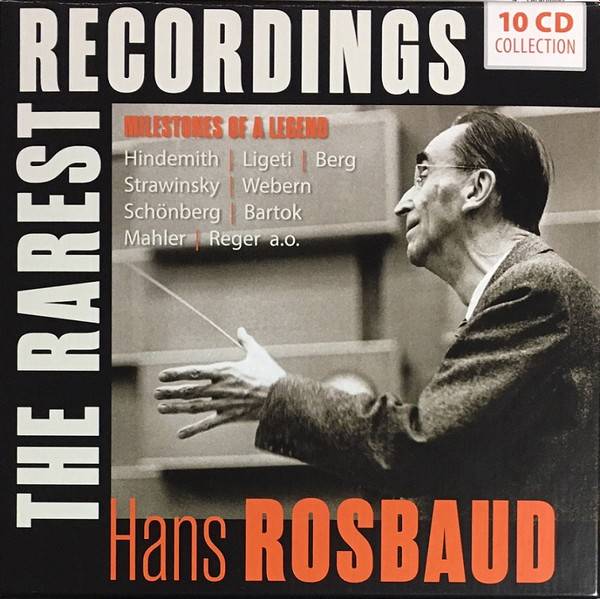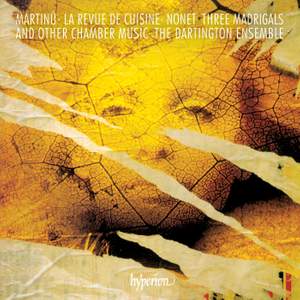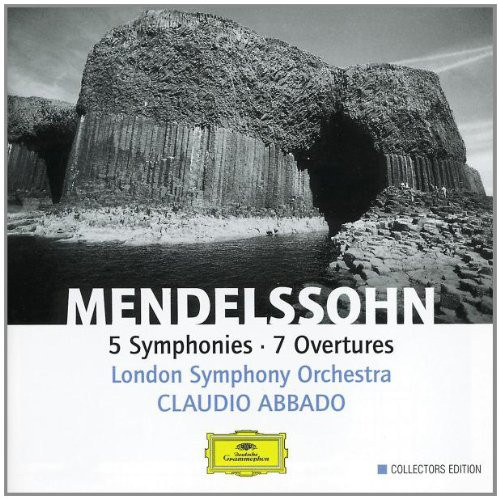- Welcome to GMG Classical Music Forum.
Recent posts
#1
General Classical Music Discussion / Re: What are you listening 2 n...
Last post by Lisztianwagner - Today at 02:30:10 PMMax Reger
Piano Concerto in F minor, Op. 114
Eduard Erdmann (piano)
Hans Rosbaud & Kölner Rundfunk-Sinfonieorchester

Piano Concerto in F minor, Op. 114
Eduard Erdmann (piano)
Hans Rosbaud & Kölner Rundfunk-Sinfonieorchester

#2
General Classical Music Discussion / Re: What are you listening 2 n...
Last post by SonicMan46 - Today at 02:13:25 PMThis afternoon, I decided to pull out my Martinu collection of just over two dozen discs:
Martinů, Bohuslav -Cello Works & Chamber Music for starters (first row of pics below) + spreadsheet of what else I own at bottom - Bohuslav was an extremely prolific composer (list HERE), some would same TOO productive - But, I do enjoy many of these works even not being much of a 20th century music fan (but I do have a number of exceptions as the 'usual suspects') -
But, I do enjoy many of these works even not being much of a 20th century music fan (but I do have a number of exceptions as the 'usual suspects') -  Dave
Dave





Martinů, Bohuslav -Cello Works & Chamber Music for starters (first row of pics below) + spreadsheet of what else I own at bottom - Bohuslav was an extremely prolific composer (list HERE), some would same TOO productive -
 But, I do enjoy many of these works even not being much of a 20th century music fan (but I do have a number of exceptions as the 'usual suspects') -
But, I do enjoy many of these works even not being much of a 20th century music fan (but I do have a number of exceptions as the 'usual suspects') -  Dave
Dave




#3
GMG News / Re: Bug Report 2024
Last post by Karl Henning - Today at 02:05:05 PMQuote from: Spotted Horses on Today at 08:08:44 AMYes, it took me forever to like this post.
(* chortle *)
#4
Great Recordings and Reviews / Re: Beethoven piano sonata sho...
Last post by Todd - Today at 01:27:22 PMQuote from: Florestan on Today at 01:20:22 PMComparison between Different Recordings of Two Piano Sonatas by Beethoven
If the thread's title means the above, mea culpa.
More than two sonatas are involved. Basic stuff.
#5
General Classical Music Discussion / Re: What are you listening 2 n...
Last post by Mapman - Today at 01:24:13 PMMendelssohn: Symphony #2 "Lobgesang"
Abbado: LSO
The first orchestral movements are wonderful.

Abbado: LSO
The first orchestral movements are wonderful.

#6
Great Recordings and Reviews / Re: Beethoven piano sonata sho...
Last post by Florestan - Today at 01:20:22 PMQuote from: Todd on Today at 12:21:33 PMIncorrect.
Comparison between Different Recordings of Two Piano Sonatas by Beethoven
If the thread's title means the above, mea culpa.
#7
General Classical Music Discussion / Re: What are you listening 2 n...
Last post by Irons - Today at 01:12:21 PMQuote from: foxandpeng on April 18, 2024, 11:08:36 AMIvo Jirásek
Symphony - 'Matka Naděje' or 'Mother Hope'
Zdeněk Košler
Czech Philharmonic
Supraphon
Left field discovery while looking for Novak's, 'The Storm' on Spotify (which doesn't seem to be available for streaming).
Can't find much on Jirásek at all, on t'internet. I like this symphony very much, however. Atmospheric, dramatic, thoughtful, punctuated with contemplative passages that build and drop tension, loud and strident brass and percussion... niiiice....
That cover rung a bell - sure enough a LP version resides on my shelves. Thanks are in order as I enjoyed the recording very much. The use of orchestra is particularly striking, a sort of symphonic concerto for orchestra if that makes sense. I don't know if you had access to programme notes but of interest that Jirasek conceived the symphony to include baritone solo to the text of a poem by Vitezslav Nezval, indeed the premiere included the vocal part. Afterwards Jirasek decided to drop the baritone solo, although the symphony is built around Nezval's poem.
#8
Great Recordings and Reviews / Re: Beethoven piano sonata sho...
Last post by Atriod - Today at 01:05:16 PMQuote from: prémont on Today at 10:58:04 AMFor some unknown reason Todd used Backhaus' stereo recording for comparison. The earlier mono recording is generally more successful.
I agree that Sonoda is good and well may be among my top ten cycles too. The many excellent cycles available are difficult to rank precisely. But Backhaus' mono is in my top two, Kempff's mono cycle being the other one.
If you read Todd's evaluations closely it's obvious that he first and foremost is led by his taste, like all of us.
I too prefer the Backhaus mono cycle in terms of performances, it is the cycle that sounds closest to what his various live recordings sound like in that extra bit of spontaneity/inspiration; which can make all the difference in the world compared to the stereo cycle even if his conception of the music on the two is similar.
That Backhaus mono cycle is squarely in my top 5. I just went through an old post I made on another board and Sonoda Evica does indeed make my top ten, at number 7/8/9 give or take as a couple of the cycles in that ranking are incomplete and one not really a cycle. Plus 5-10 are sort of hard to rank.
#9
General Classical Music Discussion / Re: What are you listening 2 n...
Last post by Todd - Today at 12:58:11 PM
It's been at least a decade since I last listened to Chailly's Mahler cycle. I think it's time to revisit it. I'll see how many symphonies I can get through.
#10
Composer Discussion / Re: Mahler Mania, Rebooted
Last post by Atriod - Today at 12:54:56 PMQuote from: Herman on Today at 09:54:05 AMI would caution against taking Bernstein's characterisations of Mahler's music too seriously. They're often deeply reductive and yet hard to shake. In one of those 'Bernstein sits down at the piano to explain music' video's he boiled down Tchaikovsky's 4th to "I want it, I want it" as if it were a rock song.
Completely ignore what Bernstein said if you have some bone to pick with him and just listen to the music attentively/uninterrupted/not doing anything else, like all great art demands. It's pretty obvious what the general feel of the piece is, the fourth movement is about as literal as Mahler gets. The only real ambiguity I hear is whether he has come to peace with things with the quiet ending or if nothing has been resolved (even the harrowing sixth symphony has a concrete resolution). Either interpretation doesn't detract from my interpretation of the symphony as a whole as taking us to the abyss.

